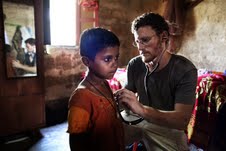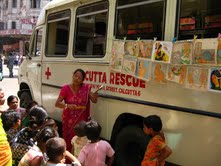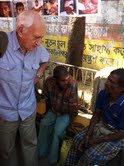Contribute
| In Conversation With Jonathan Reisman |
Sreemoti Mukerjee-Roy
09/05/2013
Lokvani caught up with Jonathan Reisman, MD, the President of the World Health and Education Network (WHEN) which he started in 2009 after returning from a trip to India. In India, he volunteered at Calcutta Rescue (CR), an NGO providing medical care to the homeless in Kolkata and in rural areas in West Bengal. His experience with the destitute on the streets of Kolkata changed his outlook forever. Determined to do something that would help Calcutta Rescue make a difference, he came back to the US and founded WHEN. WHEN is the official US support group for Calcutta Rescue. Born and raised in New Jersey, Jonathan received a B.A. in mathematics from New York University. After finishing college he worked and traveled in Russia for over a year, studying the international environmental movement and its impact on Russian industry and government policy, since the end of the Soviet Union. He then went on to study medicine and received an M.D. from the Robert Wood Johnson Medical School in Camden, NJ. He is currently a resident in combined internal medicine and pediatrics at Massachusetts General Hospital (MGH) in Boston, MA. Jonathan is a published writer in the fields of medicine, environmental sociology, and travel/adventure. He is active in the fields of medical education, global health, and wilderness and expedition medicine. Lokvani had an opportunity to talk at length with Jonathan. Lokvani: How did you get interested in Calcutta Rescue? Reisman: My interest in Calcutta Rescue stems from my concern with homelessness and healthcare. As far back as I can remember, the homeless had always drawn my attention. How had they become homeless, how they survive, what they did for healthcare. And I liked traveling. I had heard of Calcutta Rescue (CR) and when I took a year off from Med School, I decided to go to Kolkata and work with the organization. Lokvani: Could you tell us a little about Calcutta Rescue and the work you did with Calcutta Rescue and your experience in Kolkata. Reisman: Calcutta Rescue was founded in 1972 by Dr. Jack Preger, a British doctor. Dr. Preger had arrived in India working initially for Mother Theresa and later began his own independent clinic for the homeless. Today the organization has three clinics, two schools and two vocational centers. The van is a mobile medical dispensary and treatment center, so to speak. It travels to different parts of the city each day, to different locations where the homeless population tend to congregate. Many do not have the means to access traditional healthcare. So the van goes to the patients. I lived close to the CR offices in the Park Street area. Initially I did some record-keeping. I kept track of the patients who showed up at the clinic, and their follow-up visits. Most of the time they did not come back for follow-up check-ups mainly due to logistics and resources, such as transportation, no bus fare, not being able to keep track of appointments. Calcutta Rescue would then go looking for them taking the medicine and treatment to them. Later I began seeing patients. I am amazed at how many people I saw in a day! It was a lot of work, satisfying at one level, challenging in many ways, but ultimately inspiring me to found WHEN. Lokvani: Can you elaborate on some of the challenges? Reisman: Well one of the biggest challenges was the lack of resources and apathy all round. The shortage of resources – insufficient infrastructure, be it schools, or housing, or healthcare, you name it. While there is a lot development in many other aspects in India, the basic infrastructure has not kept pace with the overall growth the country is undergoing. Lokvani: The US has a large homeless population too. Do you see any difference in the two groups? Reisman: Yes, there is a difference. A big difference. In the US the homeless are usually single individuals, oftentimes with mental health issues. Whereas in Kolkata, there are families who cluster and live on the streets. It is a community, albeit one that cannot afford the “traditional†house, not even in the “bostees†as shanty towns are called in Bengal. They live primarily by scavenging using scraps of discarded materials to create makeshift dwellings where a normal life is lived. Men go out looking for work. Women cook, wash clothes, raise children. Children play nearby. There is no formal address but there is a definite place called home. Lokvani: What are your future plans for WHEN? Reisman: Although WHEN was founded to support Calcutta Rescue, we plan to expand our mission to other causes. At present we are raising funds for Uttarkhand Relief. All donations are tax-deductible as WHEN is a 501c3 tax-exempt organization You can reach us at whenUSA@gmail.com and donate at http://www.worldhealthonline.org/
You may also access this article through our web-site http://www.lokvani.com/


